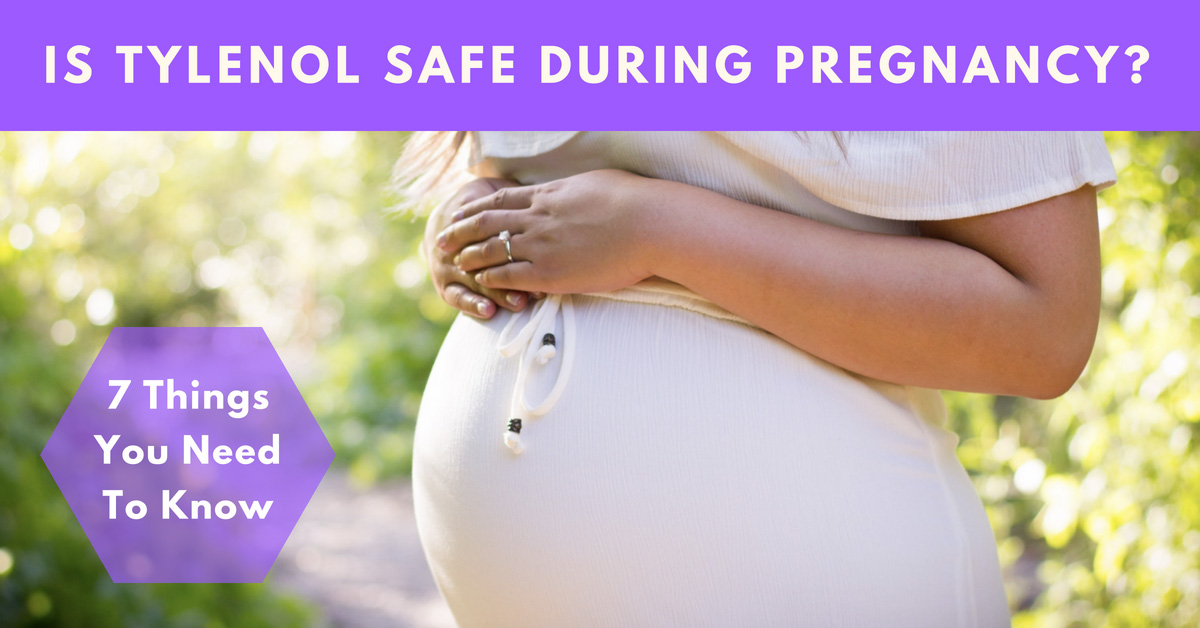
You’re pregnant. You want to do what’s best for your baby. Is Tylenol safe? Photo courtesy of Ryan Franco.
You have a bad headache. Or a backache. And a bun in the oven.
Most expectant mamas reach for Tylenol or a product containing acetaminophen, the main ingredient in Tylenol.
But is Tylenol safe during pregnancy?
Tylenol is one of the most popular pain medications on the market.
It’s used in every hospital in America. It is available over-the-counter and in prescription-only products.
Over 600 medications contain acetaminophen, aka Tylenol.
Doctors often recommend it, rather off-handedly. “Take some Tylenol,” they say.
Because ibuprofen has not been FDA-approved for babies under six months, doctors also recommend baby Tylenol for infants.
In addition, doctors also often recommend Tylenol to pregnant women prone to migraines and other aches and pains.
“Is Tylenol safe during pregnancy?” You ask your doctor.
“Sure, sure,” your doctor says.
Your doctor is, unfortunately, completely wrong and totally misinformed.
The real answer to the question is Tylenol safe during pregnancy is that there is a growing body of scientific evidence showing that Tylenol is not safe during pregnancy or during infancy.
Your doctor should not be recommending Tylenol during pregnancy.
And you should not be taking Tylenol during pregnancy.
If you’re pregnant and you’ve already taken Tylenol, take a deep breath.
It’s okay.
There’s no reason to feel guilty.
You didn’t know.
You asked your doctor is Tylenol safe during pregnancy and your doctor said yes.
But now you are learning that your doctor was wrong.
Your doctor may be wrong about other things related to pregnancy too.
That’s okay.
The information below will inform and empower you.
Don’t feel guilty.
It’s not too late to make a change to improve your health and have a healthier pregnancy and awesome birth.
Is Tylenol safe during pregnancy? Absolutely not.
I’ll explain why.
You need your glutathione
Acetaminophen, called paracetamol in Europe and Spanish-speaking countries, depletes the body of glutathione.
Glutathione is a naturally occurring chemical compound that plays several important roles in your body.
You need glutathione to rid your body of toxic substances.
It’s a powerful antioxidant, one that many doctors believe is essential to maintaining lasting good health.
Your body makes its own glutathione, which is good news.
But you need that glutathione.
You want more of it in your body to be healthy, not less.
So the last thing, the very last thing, you want to do when you’re pregnant is deplete your body of glutathione.
Yet every time you take Tylenol that is exactly what you are doing—ridding your body of one of its most important chemical compounds, putting stress on your liver, and potentially causing collateral damage because without glutathione your body has trouble detoxifying from toxic exposures.
If you take Tylenol during pregnancy you are potentially compromising your health and your baby’s health.
Is depleting your body of glutathione safe during pregnancy? No.
So is Tylenol safe during pregnancy? No.
Scientists are now hypothesizing that it may actually be worse to give Tylenol to a small baby, though this has not been adequately studied.
This is a good time for me to remind you that the absence of clear and irrefutable scientific evidence of harm does not mean something is safe. It may or may not be safe.
We started giving Tylenol to infants without making sure this pharmaceutical product was safe for babies. The burden of proof needs to be on the intervention itself, if there is a possibility that that intervention could cause harm. This is called the precautionary principle.
Unfortunately, the precautionary principle is rarely followed when it comes to medicating babies.
But if a medication or intervention has not been adequately studied, the only honest thing we can say about it is that we don’t know whether it is safe or not.
That was a long aside. I hope you’re still with me.

Tylenol taken during pregnancy is associated with health problems in offspring. Here are 7 reasons to avoid acetaminophen. Photo courtesy of Holly Troxel Photography.
So why would Tylenol be even more harmful for an infant than for a pregnant woman?
Because once a baby is born the baby no longer has the protection of the mother’s liver or the placenta.
So the negative impact of acetaminophen on the baby’s immune system and brain function may be even more pronounced.
The doctors and researchers who are paying attention to the current science, like this one, this one, and this one, do not recommend you take Tylenol during pregnancy, or that you give it to your baby or small child.
Dose Dependent Relationship Between Tylenol and Autism
A recent study by Israeli scientists found a dose-dependent relationship with acetaminophen during pregnancy and ADD, ADHD, and autism in offspring.
From the Hebrew University of Jerusalem’s press release about the study:
The analysis, which appears in the American Journal of Epidemiology, shows that prolonged exposure to acetaminophen during pregnancy is associated with a 30% increase in relative risk for ADHD (compared to those who did not take acetaminophen during pregnancy) and a 20% increase in relative risk for ASD.
These epidemiological findings have been replicated several times over.
Is Tylenol safe during pregnancy? 7 reasons why it’s not:
1. Tylenol during pregnancy has been linked to autism in offspring.
This long, detailed, exhaustively referenced scientific review by researchers at Duke University and Harvard University explains the connection between acetaminophen and autism.
2. It’s very easy to overdose on Tylenol by mistake.
Over 600 medications, both prescription and over-the-counter contain acetaminophen. It may be in your cough syrup, or your headache remedy. Even just doubling the dose of acetaminophen can cause liver failure. If you have no acetaminophen-containing products in your house, you won’t have to worry about inadvertently overdosing.
3. Too much Tylenol can cause liver damage.
Some argue that we don’t have enough information to conclude that acetaminophen during pregnancy is a causative factor in autism in children. But there is no controversy surrounding the fact that Tylenol can cause liver damage. An overdose can cause acute liver injury and even death. According to the National Institutes of Health, even at normal therapeutic doses Tylenol can cause liver injury. In case you weren’t paying attention, let me run that by you one more time. Even at regular therapeutic doses acetaminophen can cause liver injury.
4. Tylenol linked to asthma.
Acetaminophen has been so strongly associated with “wheezing disorders” in children (source) that doctors who pay attention to the science conclude that children with asthma or at risk for getting asthma should avoid it. Pregnant women with asthma should also avoid acetaminophen. Whether you are asthmatic or not, pregnancy is not the time to take a drug that may compromise your lung functioning. As the baby grows in the womb, many pregnant women find that it gets more difficult to breathe, especially in the third trimester. We need to err on the side of caution during pregnancy. Anything that may contribute to breathing difficulties of any kind, including Tylenol, should be avoided.
5. Tylenol taken during pregnancy associated with ADHD in offspring.
The Israeli study I mentioned earlier is just one of several epidemiological studies that have shown a statistically significant association between attention deficit disorders in babies of moms who have Tylenol taken during pregnancy. If you’d like to read the science yourself, or print out some peer-reviewed science to give to your doctor, you can start with this 2014 study conducted by researchers in New Zealand. This 2014 original investigation that looked at health records of over 64,000 pregnant women in Denmark and concluded that maternal use of acetaminophen puts children at higher risk of severe attention deficit disorders (hyperkinetic disorders). In addition, this 2016 study from the U.K. concludes: “children exposed to acetaminophen prenatally are at increased risk of multiple behavioral difficulties…”
Your doctor may dismiss this research as inconclusive. Fair enough. But it shows that the answer to the question is Tylenol safe during pregnancy cannot be a simple yes. A more honest answer: We don’t know. But we have reason to believe it is not.
6. Problematic to take Tylenol before or after a vaccine.
The Centers for Disease Control and Prevention currently recommends at least two vaccinations during pregnancy: one against pertussis (the Tdap) and one against the flu. If your pregnancy spans more than one flu season, your obstetrician may recommend you have the influenza vaccine twice.
Issues about whether vaccination during pregnancy is safe aside, your doctor may also recommend that you take prophylactic Tylenol before the vaccine. This is to diminish the symptoms. He may also tell you to take some afterwards to reduce the fever, aches, and pains often associated with vaccination.
What your doctor’s not telling you is that several studies show that taking acetaminophen prior to vaccination actually interferes with or blunts the immune response. You can find links and references to these studies here. It’s especially important to avoid acetaminophen after vaccination. Acetaminophen’s negative effect on your liver and detoxification pathways can make you more prone to vaccine injury. Additionally, research has shown that blunting a fever after vaccination also makes the vaccines less effective.
7. Masking pain during pregnancy may prevent understanding the root cause.
Have a headache, take some Tylenol. Have a backache, take some Tylenol. We don’t want to feel pain during pregnancy, or at any other time. That’s totally understandable. But pain, even during pregnancy, is our body’s way of signaling to us that something is wrong. In other words, you usually feel pain for a reason.
As easy and expedient as it is to take a pill to mask the pain, you will have a healthier pregnancy if you take the time to address the pain at its root. If your headache is from dehydration, for example, you need to drink more water. If your back ache is from the pressure the baby is putting on your front combined with too much sitting, getting up every 20 minutes to take a one to two minute walk, setting up a standing desk, and getting ergonomic back support for the car will not only help fix the problem but also help you get in better shape.
The answer to the question “Is Tylenol Safe During Pregnancy?” is no. So, what’s a pregnant women to do?
We now know that the answer to the question, “Is Tylenol safe during pregnancy?,” is no.
But since it’s not safe to take Tylenol during pregnancy, what pain medication is safe?
What pain remedies will help you during pregnancy without potentially harming your baby?
Glad you asked.
Alternatives to Tylenol—better, safer remedies—can be found in this post.
Related articles:
How Much Baby Tylenol is Safe?
Can You Safely Take Tylenol If You Have COVID-19?
Vaccines During Pregnancy: What You Need to Know
Published: February 24, 2019
Last update: December 7, 2022
I had to weigh the potential dangers a high fever would have on a growing fetus and potential dangers of Tylenol while pregnant. What would we do with a high fever in pregnancy?
I recently had a kidney infection during my second trimester. The pain was unbearable. In the hospital, I had tylenol, among other really intense pain medications. I’m so paranoid now about my baby’s health, but I don’t feel like I had a choice. Obviously this isn’t a normal situation, but hopefully I can at least detox now that I’m home?